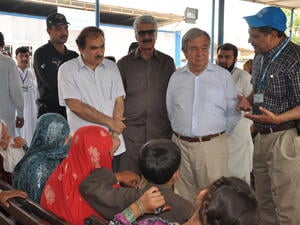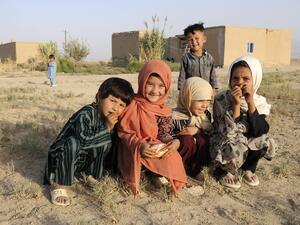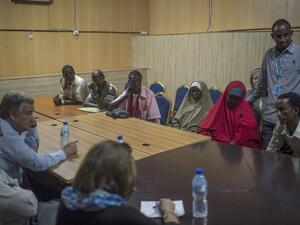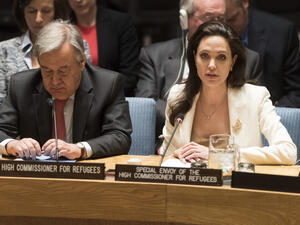UNHCR chief visits, praises refugee camp in eastern Iran
UNHCR chief visits, praises refugee camp in eastern Iran

High Commissioner António Guterres is welcomed by Afghan refugee girls at Iran's Torbat-e-Jam settlement, 80 kilometres from the Iran-Afghanistan border.
TORBAT-E-JAM, Iran, November 21 (UNHCR) - Visiting what he termed one of the world's best refugee camps, High Commissioner for Refugees António Guterres on Friday noted Iran's long record of generosity to uprooted Afghans and called on the international community to do more to ensure they can finally go home and rebuild their lives.
"In my work I'm used to visiting the worst places in the world, where people are suffering and life is tough," Guterres told refugees at Torbat-e-Jam, a settlement housing some 5,000 Afghan refugees some 80 kilometres from Iran's border with Afghanistan. "It warms my heart to visit what is probably the best refugee settlement in Iran, if not the world."
The tidy 100-hectare refugee community of solid brick houses, well-equipped schools and clinics and a mosque and community centre featuring a refugee art exhibit, was built by the Iranian government about 10 years ago. An entrance sign at the settlement announces the Torbat-e-Jam as a "guest city."
"I want to express my gratitude and appreciation for the generosity and hospitality of the Iranian people toward their sisters and brothers from Afghanistan, Iraq and other countries, and for receiving millions of refugees," Guterres said. "And let's be frank. Iran has done this with little support from the international community. I'm the first to recognize that the resources my office brings are disproportionate to the generosity of the Iranian government and people."
At one time, 8 million Afghans were in exile, mostly in Pakistan and Iran. While more than 5 million have returned to their homeland since 2002 - more than 4 million of them with UNHCR assistance - nearly 3 million refugees remain outside their country, including almost a million in Iran.
In a community meeting with refugee representatives and UNHCR's government counterpart, the Bureau for Aliens and Foreign Immigrants Affairs (BAFIA), Guterres expressed solidarity with Afghans and expressed the hope that one day he would be able to meet them in their own homes in their own country.
"It is difficult to find a nation in the world which has suffered so much in recent decades," he said. "The best solution for refugees is to go back home in a voluntary, safe and dignified way. But we all feel a certain frustration that several years after the fall of the Taliban, there are still many impediments to return."
Guterres, who arrived in Iran on Friday after four days in Afghanistan, said an international conference sponsored by the Afghan Foreign Ministry and UNHCR in Kabul on Wednesday unveiled a new strategy aimed at overcoming many of those impediments. He said there was a high degree of support from both the Afghan government and the international community at the meeting for incorporating the needs of returned refugees in Afghanistan's National Development Strategy.
Concrete projects in specific returnee locations in many parts of the country have been developed by UNHCR and various government ministries aimed at overcoming various obstacles to sustained refugee returns, including in the areas of shelter, land allocation, health, education and employment.
While humanitarian and development plans are crucial in rebuilding, an improvement in security is also required in Afghanistan, the High Commissioner said, adding that this requires a political approach and solution involving a commitment by both the international community and the Afghan government.
Guterres said he looked forward to the day when all the necessary conditions were in place for refugees to go home and resume their lives. "I think the best thing to do is to put UNHCR and BAFIA out of business," he told the applauding refugees.
By Ron Redmond in Torbat-e-Jam, Iran






